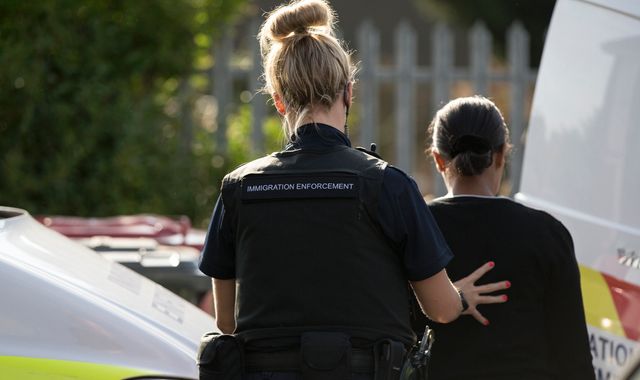The government wants to go further in extraditing foreign offenders before they have a chance to appeal by including more countries in the existing scheme.
Offenders that have a human right appeal rejected will get offshored, and further appeals will then get heard from abroad.
It follows the government announcing on Saturday that it wants to deport criminals as soon as they are sentenced.
The “deport now, appeal later” policy was first introduced when Baroness Theresa May was home secretary in 2014 as part of the Conservative government’s hostile environment policy to try and reduce migration.
It saw hundreds of people returned to a handful of countries like Kenya and Jamaica under Section 94B of the Nationality, Immigration and Asylum Act 2002, added in via amendment.
In 2017, a Supreme Court effectively stopped the policy from being used after it was challenged on the grounds that appealing from abroad was not compliant with human rights.
However, in 2023, then home secretary Suella Braverman announced she was restarting the policy after providing more facilities abroad for people to lodge their appeals.
Now, the current government says it is expanding the partnership from eight countries to 23.
Previously, offenders were being returned to Finland, Nigeria, Estonia, Albania, Belize, Mauritius, Tanzania and Kosovo for remote hearings.
Angola, Australia, Botswana, Brunei, Bulgaria, Canada, Guyana, India, Indonesia, Kenya, Latvia, Lebanon, Malaysia, Uganda and Zambia are the countries being added – with the government wanting to include more.
Read more:
Govt vows to deport foreign criminals immediately
First migrants detained under returns deal with France
The Home Office claims this is the “the government’s latest tool in its comprehensive approach to scaling up our ability to remove foreign criminals”, touting 5,200 removals of foreign offenders since July 2024 – an increase of 14% compared with the year before.
Home Secretary Yvette Cooper said: “Those who commit crimes in our country cannot be allowed to manipulate the system, which is why we are restoring control and sending a clear message that our laws must be respected and will be enforced.”
Foreign Secretary David Lammy said: “We are leading diplomatic efforts to increase the number of countries where foreign criminals can be swiftly returned, and if they want to appeal, they can do so safely from their home country.
“Under this scheme, we’re investing in international partnerships that uphold our security and make our streets safer.”
Both ministers opposed the hostile environment policy when in opposition.
👉 Click here to listen to Electoral Dysfunction on your podcast app 👈
In 2015, Sir Keir Starmer had questioned whether such a policy was workable – saying in-person appeals were the norm for 200 years and had been a “highly effective way of resolving differences”.
He also raised concerns about the impact on children if parents were deported and then returned after a successful appeal.
In today’s announcement, the prime minister’s administration said it wanted to prevent people from “gaming the system” and clamp down on people staying in the UK for “months or years” while appeals are heard.






























